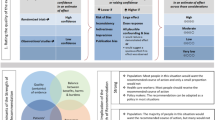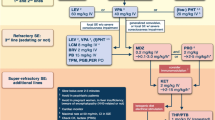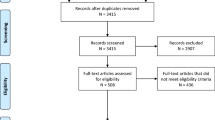Abstract
Background
To define the clinical profile and outcome of patients in prolonged refractory status epilepticus (PRSE), and investigate possible predictors of outcome.
Methods
We reviewed 63 consecutive patients with PRSE cared for in the medical and neurointensive care units of three academic medical centers over a 9-year period. For this multi-center retrospective cohort study, PRSE was defined as SE that persisted despite at least 1 week of induced coma. Variables examined for their relationship to outcome included etiology, EEG, neuroimaging, and age.
Results
Forty-two (66 %) of 63 patients in PRSE survived to discharge from hospitalization. Fourteen (22 %) patients had a good outcome (mRS ≤ 3) at last available follow up (at least 6 months post-PRSE). Of these, 6 (10 %) individuals had no significant disability and were able to carry out all usual activities (mRS = 1). Normal neuroimaging and a reactive EEG at onset of PRSE were associated with good outcome. Good or excellent clinical outcomes were possible in patients in PRSE for up to 79 days, and in patients up to 69 years old.
Conclusions
Good outcome is not unusual in PRSE, including in some older patients, in a variety of diagnoses, and despite months of coma.




Similar content being viewed by others
References
Mayer SA, Claassen J, Lokin J, Mendelsohn F, Dennis LJ, Fitzsimmons BF. Refractory status epilepticus: frequency, risk factors, and impact on outcome. Arch Neurol. 2002;59(2):205–10.
DeLorenzo RJ, Hauser WA, Towne AR, et al. A prospective, population-based epidemiologic study of status epilepticus in Richmond, Virginia. Neurology. 1996;46:1029–35.
Lowenstein DH, Alldredge BK. Status epilepticus. N Engl J Med. 1998;338:970–6.
Cooper A, Britton JW, Rabinstein AA. Functional and cognitive outcome in prolonged refractory status epilepticus. Arch Neurol. 2009;66(12):1505–9. doi:10.1001/archneurol.2009.273.
Drislane FW, Lopez MR, Blum AS, Schomer DL. Survivors and nonsurvivors of very prolonged status epilepticus. Epilepsy Behav. 2011;22(2):342–5.
Bramstedt KA, Morris HH, Tanner A. Now we lay them down to sleep: ethical issues with the use of pharmacologic coma for adult status epilepticus. Epilepsy Behav. 2004;5(5):752–5.
van Swieten J, Koudstaal P, Visser M, Schouten H, et al. Interobserver agreement for the assessment of handicap in stroke patients. Stroke. 1988;19(5):604–7.
Young GB, Kreeft JH, McLachlan RS, et al. EEG and clinical associations with mortality in comatose patients in a general intensive care unit. J Clin Neurophysiol. 1999;16:354–60.
Austin EJ, Wilkus RJ, Longstreth WT Jr. Etiology and prognosis of alpha coma. Neurology. 1988;38:773–7.
Aminoff MJ, Simon RP. Status epilepticus. Causes, clinical features and consequences in 98 patients. Am J Med. 1980;69(5):657–66.
Holtkamp M, Othman J, Buchheim K, Masuhr F, Schielke E, Meierkord H. A “malignant” variant of status epilepticus. Arch Neurol. 2005;62:1428–31.
Hocker S, Britton JW, Mandrekar J, Wijdicks EFM, Rabinstein AA. Predictors of outcome in refractory status epilepticus. JAMA Neurol. 2012;1–6. doi:10.1001/archneurol.2013.578.
Acknowledgment
This study was conducted on behalf of the Critical Care EEG Monitoring Research Consortium. The Critical Care EEG Monitoring Research Consortium receives support from the American Epilepsy Society.
Author information
Authors and Affiliations
Corresponding author
Rights and permissions
About this article
Cite this article
Kilbride, R.D., Reynolds, A.S., Szaflarski, J.P. et al. Clinical Outcomes Following Prolonged Refractory Status Epilepticus (PRSE). Neurocrit Care 18, 374–385 (2013). https://doi.org/10.1007/s12028-013-9823-4
Published:
Issue Date:
DOI: https://doi.org/10.1007/s12028-013-9823-4




